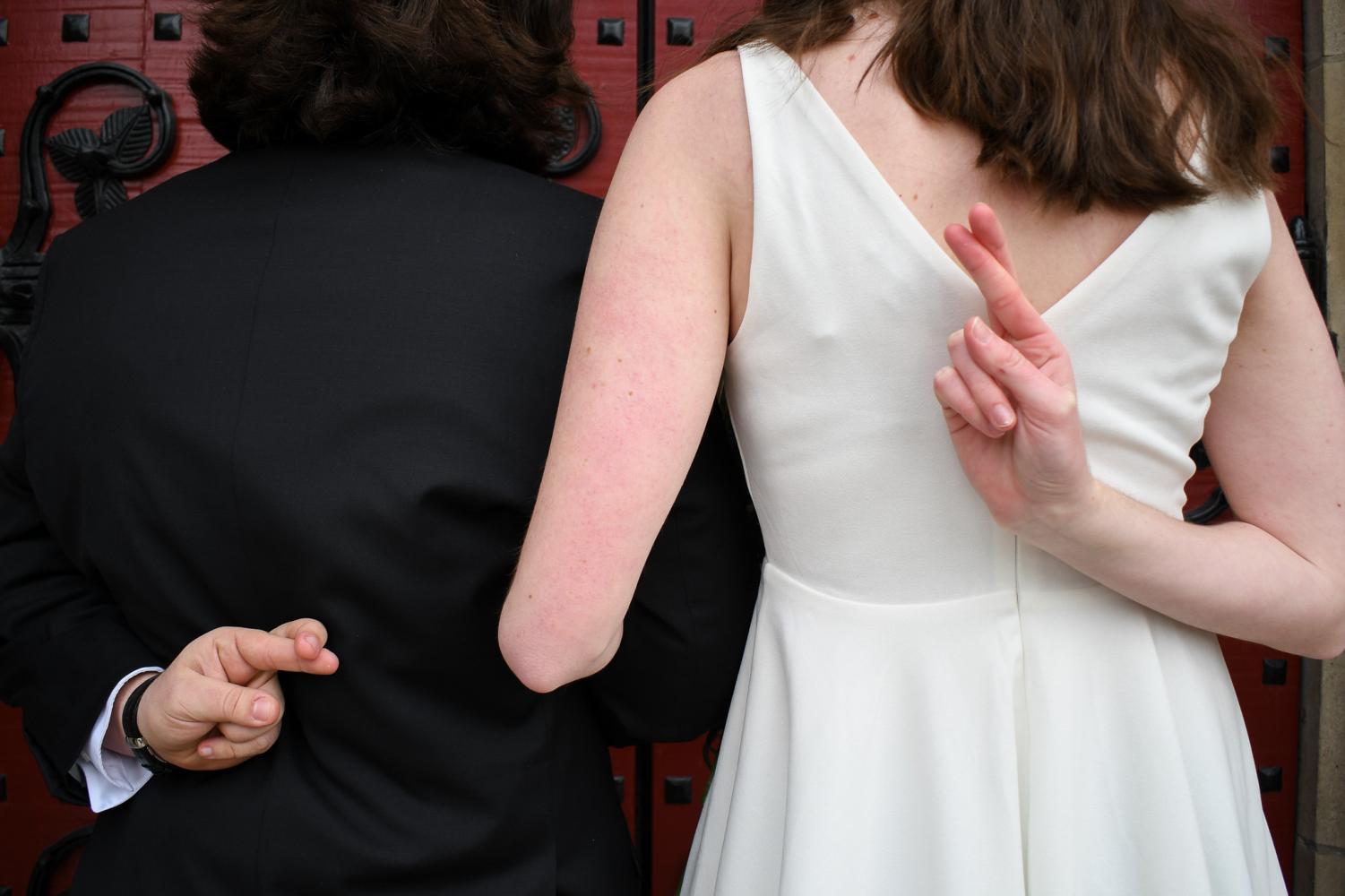Pitt Marriage Pact struggles to help students find love, so far


A couple crosses their fingers behind their backs.
Isabelle Layding, a sophomore economics and supply chain management major, got a match through the Pitt Marriage Pact in the 99.99th percentile — one of the best matches on campus 一 and the match didn’t go beyond a single direct message.
“I didn’t have the intentions of dating, and [the lack of conversation] made me think we had similar motivations of [the pact] being frivolous and fun,” Layding said. “I have had a lot of serious dating experience, and there are things that can’t be quantified that determine the success of a relationship.”
The Marriage Pact boasts, “Leave it up to our algorithm and find your perfect backup plan today.” Although the pact promises love through its match-making algorithm, many students don’t seem so lucky.
The pact, created by Stanford student Liam McGregor, consists of more than 100 multiple-choice questions covering what McGregor considers the core of long-term compatibility 一 personal values, personality traits, romantic behaviors and relationship expectations. Last month, first-year undecided major Abner Gordan brought it to Pitt.
Prompts included simple preferences like “It’s okay if my partner drinks” and more complex questions such as, “Is there such a thing as unconditional love?” After completing the survey, an algorithm matches participants on college campuses across the country to one other person at their school. According to the Marriage Pact site, the algorithm has produced 131,890 matches from 78 college campuses.
Shreya Gaddam, a sophomore supply chain management and marketing major, said she heard Marriage Pact success stories from other universities, so she felt optimistic about completing the pact.
“A friend of a friend at Virginia Tech was talking to this guy but it kind of fizzled out,” Gaddam said. “She did the Marriage Pact and matched to that same guy she was talking to a few weeks before. They started talking again and they’ve been dating for a year.”
Gordan contacted representatives through the Marriage Pact site and, after assembling a team and attending a meeting with a Marriage Pact team ambassador, began marketing it to Pitt students.
“The goal was for it to be the moment. We needed it to be everywhere,” Gordan said. “The big thing was getting Pitt Chicks to post it on their story, which gave us a big boost. We made posters and hung them up everywhere during the week. It was the only thing I talked about for, like, seven days.”
After just one week of the Marriage Pact opening, 3,000 people filled out its survey, and many more interacted with it through conversation or social media, Gordan said. Despite such a large reach, few are actually meeting with their matches. Gordan speculated that the reason for this hesitancy is fear.
“I think it’s because you’re only getting one person, one match. You’re investing in it,” Gordon said. “When you’re matching with someone on Tinder you have nothing to lose. With the Marriage Pact, there’s a lot more pressure. You’re supposed to get along with this person. There’s a fear of failure.”
This idea of an imperfect algorithm is also clear in the case of Gordan’s friend, who rejected someone two days before discovering they were a 99.99th percentile match through the Marriage Pact.
Despite its flaws, the pact made Layding consider the characteristics of an ideal partner, she said.
“I did answer honestly, and it was actually kind of interesting because it made me reflect on a lot of qualities I’m looking for in a partner. It was prompting me to think about things I’ve never thought about before,” Layding said. “Plus, what qualities people may be looking for in me.”
For some like Kristina, a sophomore who asked only to use her first name, the match wasn’t a stranger. Although one may assume that matching through the Marriage Pact would make conversation easier, it’s created an awkward tension, according to Kristina.
“He’s been in three of my classes. We’re in the same classes now and it’s so awkward because we both know, and I’ve always thought he was kind of cute, but I’ve never spoken to this man,” she said. “I think it was funny for everyone to do and was more of a Tinder thing, where you can match up with someone but nothing really comes from it.”
The night before matches were released, participants received an email — either with the initials of their match, or a message explaining that they weren’t matched yet because so many more women than men completed the survey. Gordan guessed that this is due to the expectations of women versus men in romantic relationships.
“I think it’s more on a societal level, women feel a lot more pressure to get married younger and have a life. Men have way more options. They can be less traditionally desirable and get a match in real life,” Gordon said. “Women feel so pressured to be perfect all the time and are taught that they’re disposable.”
Layding agrees, especially when it comes to Gen-Z dating.
“I think that girls were more curious, kind of taking it as ‘see what happens,’ whereas I honestly wonder if guys saw the word marriage and were freaked out by that,” Layding said. “Within Gen Z, men and women view dating very differently. Generally, most women I know view dating less casually than the men that I know, if the guys are even thinking of dating at all.”
Max Barrett, a sophomore mathematics and economics major, said he, too, took the pact out of curiosity. Although his match was in the 97th percentile, he gave up on connecting after failing to find her Instagram.
“I didn’t really expect to find my future partner,” Barrett said. “I was curious about the questions and how they match people. When I saw [the compatibility], I was a bit more interested, but it’s just a survey.”
If students feel hesitant to reach out to their match, Gordan has some advice.
“No matter what, it will make your life more interesting, for better or for worse. This is your one shot at love, just do it,” Gordan said.
Recent Posts
SGB introduces new governing code bill and addresses rumors of ICE on campus
At its weekly meeting at Nordy’s Place on Tuesday, Student Government Board introduced an omnibus…
Opinion | School should be in the summer
Although this may be controversial, I believe that from this data, it is evident that…
Weathering the storm: Pittsburgh teams have tackled some of the toughest environments
The end of the year in western Pennsylvania is always marked by two things —…
Notes From an Average Girl // Notes on Book Banning
In this edition of Notes From an Average Girl, senior staff writer Madeline Milchman writes…
To Be Honest // Yup, it is that damn phone
In this edition of To Be Honest, staff writer Evin Verbrugge writes about her phone…
Meaning at the Movies | Portraying Toxic ‘Adolescence’
In this edition of Meaning at the Movies, staff writer Lauren Deaton explores the mini-series…

